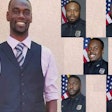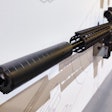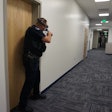At first blush, one would be hard pressed to connect the dots between that Michael Keaton clunker of a film "Multiplicity" and TREXPO. Nonetheless, I found myself thinking of the cloning comedy throughout the three-day training conference and expo because if there's one frustrating thing about TREXPO WEST, it's one's inability to be at multiple places at once.
TREXPO always has a wide array of presentations put on by topflight professionals who work with and within the law enforcement community. Time and again, their experience and expertise become readily apparent through the seminars, training sessions, and panel discussions they helm. These instructional blocks cover everything from evolving terrorist threats, to the best clotting agents, to armed and unarmed defensive tactics, to gang intelligence, to tactics, to....well, you get the idea.
And these are not mere "we're here to take the money and run" presentations. Presentations run anywhere from one to four hours, with a surprising amount of timely information communicated in a manner that is often as entertaining as it is enlightening (and often employing the "good BS" that I've referred to in previous columns and that all cops love). Best of all, the presenters generously take their time to field questions posed by groups and individuals: You really get a sense of the commitment these men and women have to our profession.
The TREXPO West seminars I was fortunate enough to take in at the Long Beach Convention Center earlier this include:
Executive Protection/Private Corporate Security
William Cage and Steven T. Baker conducted an in depth look at the world of executive protection. While acknowledging that the unique skill sets possessed by many officers make them desirable candidates, they pointed out the sometimes antagonistic aspects of the two professions' mindsets (e.g., proactive enforcement vs. prevention) and how the landscape of personal protection is dotted with landmines for the freelancing cop, including lack of insurance and the need to obtain a variety of permits and licenses.
They pointed out the importance of not only vetting one's employees, but one's clients, as well. Given the amount of intimate contact with celebrity lifestyles, protectors can find themselves in awkward—and not to mention dangerous—situations. Cage and Baker's presentation also took a look at the dark side of some well-publicized celebrity pranks and their implications for the future.
I came away with a greater appreciation for the innumerable challenges that the world of executive protection offers and readily recommend that anyone who has any interest in security work either on the side or as a future career attend a course taught by these gentlemen, if given the opportunity.
How SWAT Officers Get Killed
Former LAPD SWAT officer and tactical consultant Ron McCarthy dissected the less savory aspects of the profession that not only undermine our mission, but endanger officers' lives and careers. McCarthy cited how practices of favoritism, supervisorial cowardice, and incompetency have gotten SWAT officers and civilians alike injured and killed in states across the country.
Using the tragic example of Arizona SWAT Officer Norm Brice, he illustrated how the cowardly prosecution of a sniper by his own police chief can destroy careers and families. He also discussed the three-part action criteria that should be included in every SWAT operation plan, the four phases of a critical incident, and a host of other considerations that go into developing and implementing a viable SWAT operation plan.
In the second part of his four hour presentation, McCarthy presented a PowerPoint presentation of the implications of Beslan- and Mumbai-like attacks for SWAT personnel. "Accept the fact that there are going to be losses. Success is defined in minimizing those losses as much as possible," McCarthy said.
McCarthy noted that while it is a relatively new concept, active shooter engagement protocol may yet be dramatically modified in the near future, particularly given the successful intervention of a lone North Carolina officer during the recent nursing home massacre.
Gangs Panel
Los Angeles area news anchor Chris Blatchford moderated the Gang Panel, playing host to four of southern California's most knowledgeable veteran law enforcement members, including PoliceMag.com’s Gangs Channel columnist Richard Valdemar.
Blatchford screened a news segment on Tortilla Flats gang of East Los Angeles that focused on the lives of ten- and twelve-year-old gang members “Midget” and “Chuckie.” He then gave an update about what happened to the youths since the segment aired. Hint: It wasn't good.
The veteran panel discussed the escalating threats of gangs and the real and personal impact the individual officer can have on at-risk children—and the vested personal interest they have in doing so. Prosecutor Anthony Manzella drove home the salient point that cops shouldn't be content with the sometimes anemic efforts of rookie prosecutors.
"School your prosecutors," said Manzella. "They need to know what to look for.” Manzella amply illustrated the difference in the case of a 14-year-old who was initially convicted for only one of three murders that he'd committed. He was subsequently convicted for all three and received a much longer sentence. The difference? Aggressive prosecution and the expert testimony of expert gang investigators.
The “Mack”
Keynote speaker and host of the Discovery Channel TV show "FutureWeapons" Richard “Mack” Machowicz gave a dynamic presentation on how technology is helping law enforcement in its mission of keeping the peace and keeping officers alive, even finding a nexus between sniper training and "Sesame Street." Mack explained, "I found from my sniper experience, when I was going through all the observation training, when I actually did things in the field, finding the thing that doesn't belong is the key to staying alive...(Kermit falsetto)...One of these things isn't quite like the other..’”.
Mack discussed the evolution of the television show, and how he balked when he was initially approached to do the series. Producers wanted to take a left-of-center viewpoint and call the show "Overkill." Mack's take it or leave it counteroffer to do it straight down the middle as he wanted was ultimately accepted.
His reason for challenging the show's outline? "Because the job is hard enough that you guys have to do every day. People care more about their dogs than they do about the carnage that our guys overseas and you cops over here have to deal with every day. It's awfully difficult to operate as a good guy in an insane world.”
Mack made a strong case for science and technology’s impact in making a difference for the guys in the field: “increasing their ability to be accurate, minimizing collateral damage, and getting your ass back to your family.” The former Navy SEAL’s heartfelt and candid presentation garnered a deserved standing ovation at its close.
The above reflects just a sampling of the information communicated at each of the events I attended at this week’s TREXPO West, which are themselves but a sampling of all of TREXPO's offerings. Besides the many presentations that took place upstairs, a variety of raffle drawings and competitions were held downstairs in the Expo showroom, itself a host to those state-of-the-art tools designed to help you safely go in, through, and out a variety of obstacles.
Despite being very much under the weather, I had a great time at TREXPO, revisiting friends and meeting new ones. Anyone who says there's not a sense of community at a TREXPO event has never been to one. It’s a target-rich environment for networking and brainstorming, one is hard pressed to navigate their way around TREXPO without encountering impromptu hallway discussions about any number of topics. Sadly, Oakland's recent tragedy was the perhaps the most discussed this year.
More than ever, TREXPO offers important valuable expertise and training in a single forum at a time when training dollars are limited.
Maybe if cloning technology advances, I'll be able to squeeze in more of these sessions at once next year.













